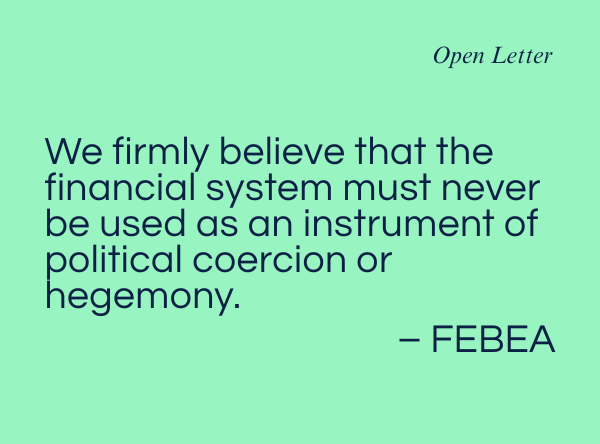Share this post:

Brussels, 15th October 2025
To the Attention of:
Dears Members of the European Parliament,
FEBEA –the European Federation of Ethical and Alternative Banks and Financiers– is writing to you on behalf of its member institutions, including ethical and alternative banking institutions and non-bank financial actors, to express our deep concern regarding recent developments that misuse the international financial system and legal instruments in ways that undermine fundamental rights, the rule of law, and the principle of financial inclusion, all essential components of the European Union’s identity and values. These developments do not affect FEBEA and its members alone. Many European financial institutions — even those operating fully within EU law — face similar difficulties due to the indirect impact of extraterritorial measures. For this reason, we feel a shared responsibility to raise awareness and to react against practices that undermine the Union’s legal autonomy and values.
In 2025, US President Donald Trump issued two Executive Orders imposing sanctions on the International Criminal Court (ICC) and on Ms. Francesca Albanese, the United Nations Special Rapporteur on the situation of human rights in the occupied Palestinian territories. These unilateral measures have sparked serious concerns regarding the independence of international justice and the protection of human rights. The European Union has publicly expressed its regret over these sanctions, which, notably, carry no legal weight within EU jurisdiction. Their adoption is particularly troubling given that the work of both the ICC and Ms. Albanese represents legitimate efforts to uphold international law and safeguard human rights. Nonetheless, these measures may have significant indirect effects on European citizens and institutions. One illustrative case is that of Banca Etica, an EU-based ethical financial institution and member of FEBEA, which, despite operating entirely under European legislation and principles, was unable to open a bank account for Ms. Albanese because of the indirect consequences of the U.S. sanctions regime.
This situation highlights a much broader vulnerability: any European financial institution could face similar obstacles. Even when sanctions have no legal force within the Union, their extraterritorial reach creates a climate of uncertainty and over-compliance. Banks risk the closure of correspondent accounts, delays or rejections of international transfers, and reputational repercussions when perceived as handling “sensitive” clients. Consequently, institutions often prefer to deny legitimate services rather than expose themselves to potential secondary effects, effectively extending the impact of foreign measures into the European legal space. This reveals the real and damaging reach of extraterritorial measures that, though legally inapplicable in Europe, are enforced in practice through the dominance of the U.S. financial system and the over-compliance of global intermediaries.
This situation exposes a profound contradiction. While the EU legal framework, including the Blocking Statute, is designed to protect its citizens and businesses from the extraterritorial application of foreign measures, in practice its enforcement remains weak. As a result, individuals and institutions operating entirely within EU law, who have committed no wrongdoing and are targeted solely for political reasons, may find themselves excluded from essential financial services or pressured to comply with measures contrary to the principles of EU sovereignty and autonomy.
We firmly believe that the financial system must never be used as an instrument of political coercion or hegemony. The autonomy of the European Union, and its credibility as a defender of international law and human rights, depend on its ability to shield its citizens and intermediaries from such external pressures. Moreover, access to basic payment services, recognised by EU law as essential for economic and social inclusion, cannot be jeopardised by foreign sanctions regimes with no legal standing in Europe.
For these reasons, we respectfully urge the European Parliament to take an active role in addressing this issue. We call upon the Parliament to reaffirm the EU’s opposition to the extraterritorial application of unilateral sanctions, to ensure the effective implementation and possible strengthening of the Blocking Statute, and to promote an institutional dialogue with the European Commission and the High Representative on measures that protect European intermediaries and citizens affected by such policies.
We would also welcome a structured discussion within the relevant parliamentary committees on how to reinforce the Union’s financial and legal sovereignty, in line with the principles of fairness, inclusion, and the protection of human rights.
We remain at your disposal to provide further information and to collaborate in identifying constructive and legally sound solutions to this growing challenge.
Respectfully,
On behalf of FEBEA –the European Federation of Ethical and Alternative Banks and Financiers